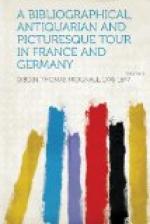Thus absorbed in a variety of contending reflections, a tall figure, clad in a loose long great coat, in a very gracious manner approached and addressed me. “Your name, Sir, is D——?” “At your service, Sir, that is my name.” “You were yesterday evening at Monsieur Pluquet’s, purchasing books?” “I was, Sir.” “It seems you are very fond of old books, and especially of those in the French and Latin languages?” “I am fond of old books generally; but I now seek more particularly those in your language—and have been delighted with an illuminated, and apparently coeval, MS. of the poetry of your famous OLIVIER BASSELIN, which...” “You saw it, Sir, at Monsieur Pluquet’s. It belonged to a common friend of us both. He thinks it worth...” “He asks ten louis d’or for it, and he shall have them with all my heart.” “Sir, I know he will never part with it even for that large sum.” I smiled, as he pronounced the word “large.” “Do me the honour, Sir, of visiting my obscure dwelling, in the country—a short league from hence. My abode is humble: in the midst of an orchard, which my father planted: but I possess a few books, some of them curious, and should like to read double the number I possess.” I thanked the stranger for his polite attention and gracious offer, which I accepted readily.... “This evening, Sir, if you please.” “With all my heart, this very evening. But tell me, Sir, how can I obtain a sight of the CHAPTER LIBRARY, and of the famous TAPESTRY?” “Speak softly, (resumed the unknown) for I am watched in this place. You shall see both—but must not say that Monsieur —— was your adviser or friend. For the present, farewell. I shall expect you in the evening.” We took leave; and I returned hastily to the inn, to tell my adventures to my companion.
There is something so charmingly mysterious in this little anecdote, that I would not for the world add a syllable of explanation. Leaving you, therefore, in full possession of it, to turn and twist it as you please, consider me as usual, Yours.
[135] [Mons. Licquet supposes the crypt and the arcades
of the nave to be
of the latter end of the eleventh
century,—built by Odo, Bishop of
Bayeux, and Brother of William
the Conqueror; and that the other
portions were of the twelfth,
thirteenth, and fourteenth centuries. I
have very great doubts indeed
of any portion being of a date even so
early as 1170.]




